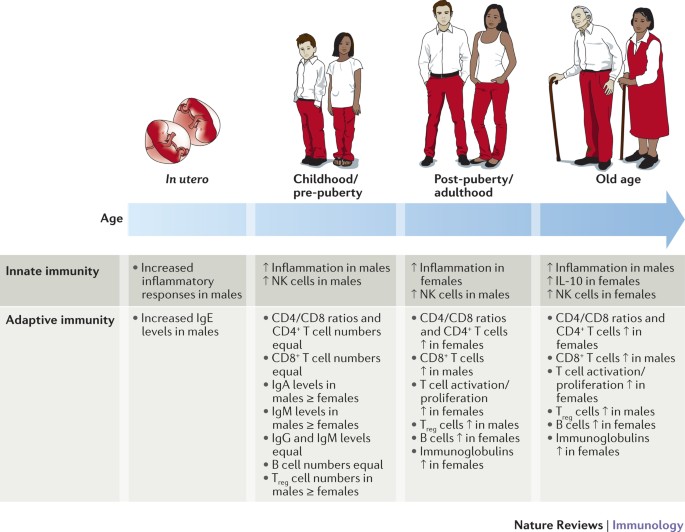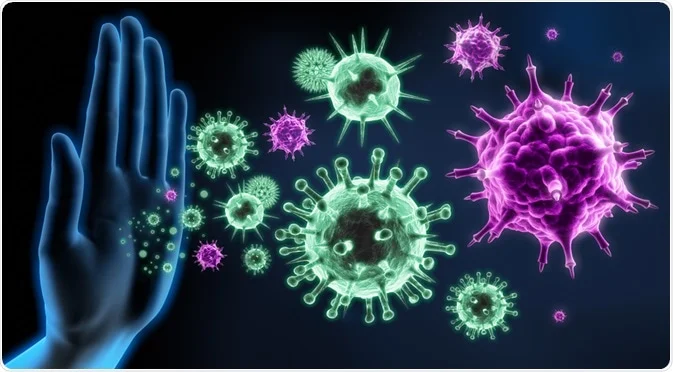Written by Lipika B Nabajya
Edited by Himanshi Shivani
“Mirror mirror hanging on the wall,
Tell me who is the strongest of all?”
...wait a minute dude, it's not that simple. Is there anything on this earth that is more exciting than a war of the genders? Mostly it is the social gender roles, but, hey, there’s another battleground of the genders in form of a biological war run by the body’s immune response system. So can this battle finally tell us who is the strongest – men or women? But before diving deep let's understand what immunity is all about.

What is immunity?
The ability of the physical body to resist or prevent a particular infection or toxin released by the action of foreign bodies like specific antibodies or sensitized white blood cells.
Generally, humans have three types of immunity:
Innate Immunity: Everyone is born with innate (or natural) immunity. For example, the skin acts as a protective shield to block germs from getting into the body.
Adaptive Immunity: Adaptive (or active) immunity develops throughout our lives. Develops through exposure to various diseases and immunization.
Passive Immunity: Passive immunity is getting protection from another source for a short time. For example, a mother's breast milk gives a baby the antibodies present in a mother’s on a temporary basis to fight diseases the mother has been already exposed to.

Now let’s get back to the war. Both the male and the female body have similar immune system buildup which consists of white blood cells like phagocytes, lymphocytes, and neutrophils, and others like mast cells and cytokines. It has been discovered long back that unique mast cells - (long-lived tissue-resident cells) differences in genders is the reason why females are more susceptible to certain diseases as compared with their male counterparts. The female mast cells create and stock more inflammatory substances. When these mast cells are activated by any stressors or allergic substances, female mast cells release the inflammatory substances like histamine, serotonin, and proteases in higher amounts which can promote a more aggressive immune response such as anaphylaxis– a serious and potentially life-threatening reaction and leaky gut. This unique difference of the female mast cells to store and release more histamine and proteases may explain why female mast cells can trigger a more potent immune reaction.

But then why do men have higher mortality as seen during the COVID -19 phase?
The male mast cells have less inflammatory substances and they are less prone to suffer hyperactive immune disorders like autoimmune diseases, chronic pain disorders, and Irritable Bowel Syndrome. But, there’s another side of the coin. Because women naturally have a much stronger immune system compared to men owing to natural processes like giving birth, they have more potentially effective immune responses to foreign bodies like viruses and bacterias. Mast cells are the first immune cells to become activated against a foreign body invasion and are critical for channeling the immune responses that are necessary for cleaning infections and for creating immunity to prevent further infections. Therefore, women’s immune systems are considered superior. The Mast cells are the sources of cytokines, chemokines, and various other growth factors. Clinical data reveals that inflammatory responses differ in both sexes, however, the mechanisms are elusive and difficult to find. But then what puts males in the danger zone. The answer to this question, according to scientists and experts, could be the emerging evidence as seen in many cases where severe COVID-19 may have been triggered by an overreaction of respective patients' immune systems against the infection as the body starts to attack its own cells and tissues, and not the virus itself. This type of abnormal immune response towards the infection is called ‘cytokine storm’, which is assumed to be one of the major fuelling agents of COVID-19. Cytokines are a type of cell signaling molecule that promotes cell to cell communication during immune responses and thereby stimulates the flow of cells towards locations of inflammation or infection. As per the research, high blood levels of cytokines have been found in patients with COVID-19 infection.
High cytokines flow reduces oxygen utilization in the body and causes a state of hypoxia- insufficient oxygen and it kills cells and tissues, which then leads to multiple organ failures like kidney, heart, and brain failure.
In the COVID-19 patient, the cytokine storm begins in the lungs, and the lungs get affected initially, then as the storm becomes stronger it starts attacking other visceral organs of the body which leads to multiple organ failure. As oxygen starts depleting in the body, it starts working less efficiently and finally fails.
Cytokine storms are quite unpredictable and uncontrollable, they can only be modulated up to some extent with some immunomodulation medicines that can keep the immune system active and prevent it from attacking all cells. It is however not possible to stop cytokine storm because, in their absence, the virus itself will kill the patient.

Let's conclude with some quick tips to combat COVID-19:
Take it as a thumb rule. Anything that comes out of a packet depletes immunity and anything that comes out of nature increases immunity. So try and eat as much naturally occurring food as you can.
Ginger Lemon Tea: This will not only refresh you but also help you to deep cleanse your body from within.
Exercise daily and increase muscle stamina.
Do not stress yourself . stress reduces immunity.
Get some sunlight if possible each day.
I hope my article is informative and useful. Do write your comments in the box below!




0 Comments